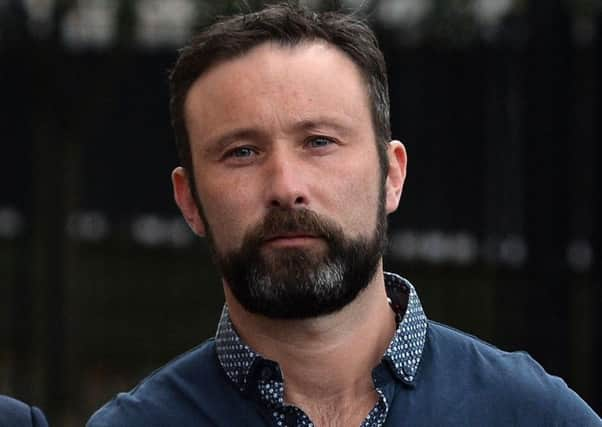PSNI officers disciplined for Damien McLaughlin bail fiasco


Damien McLaughlin, whose trial in connection with the murder of prison officer David Black collapsed last week, absconded in November 2016.
It was not until March 2017 that McLaughlin, who had been on bail since 2014, was arrested in Donegal.
Advertisement
Hide AdAdvertisement
Hide AdThe police ombudsman carried out an investigation into the incident, which found failings in aspects of the police handling of McLaughlin’s bail conditions.
These failings included breakdowns in communication, as well as failures to adhere to police processes and in the assessment of information on police systems.
As a result, the ombudsman determined that bail conditions were “not effectively monitored and enforced”.
A spokesperson for the ombudsman told the News Letter: “We made recommendations to the PSNI, which have resulted in two police officers being disciplined.
“Mr Black’s family have been advised of our findings.
Advertisement
Hide AdAdvertisement
Hide Ad“The police ombudsman has also endorsed action taken by police to prevent a recurrence, following an internal police review of what went wrong.”
The PSNI told the News Letter that it had nothing further to add to the ombudsman’s statement.
Mr Black, a warden at HMP Maghaberry, was shot dead as he drove to work along the M1 motorway near Lurgan in November 2012.
McLaughlin, 41, of Kilmascally Road near Ardboe in Co Tyrone, was arrested a few months after the murder but was granted bail in May 2014 to an address in west Belfast.
Advertisement
Hide AdAdvertisement
Hide AdWhen McLaughlin was noticed to have stopped reporting to the police, PSNI officers called at the Glenties Drive house in December 2016 only to discover that the house was empty of furniture and the milk found in the fridge was several weeks old.
A subsequent court hearing in Belfast heard that when officers checked his address in Ardboe, and others connected with his family members, the inquiries proved to be “of no assistance”.
McLaughlin was finally apprehended in Donegal in March 2017.
He was remanded in custody in the Republic on the charges of possessing articles in connection with terrorism, preparation of acts of terrorism and belonging to a proscribed organisation.
Advertisement
Hide AdAdvertisement
Hide AdMcLaughlin was first granted bail in relation to this matter at a High Court hearing back in May 2014, where it was predicted that it could take two years for the case to come to trial. Mr Justice Weatherup said it would be “unwarranted” to keep McLaughlin on remand until then.
Bail conditions were imposed, namely: reporting to police daily, wearing an electronic tag, observing a night-time curfew, and being banned from contacting another named individual.
McLaughlin’s barrister argued that tagging was associated with sexual offenders and that his client may be stigmatised. The judge rejected this.
According to Public Prosecution Service records, two sureties of £750 were agreed to secure his release. While police objected to this low amount, the PPS did not.
Advertisement
Hide AdAdvertisement
Hide AdThe PSNI previously told the News Letter that they strongly objected to bail being granted in the first place to McLaughlin, while the PPS have said they had “continuously” raised objections.
According to the PPS, a court ordered the removal of McLaughlin’s tag in December 2014, over the objections of both the PPS and police.
In January 2016, Mr Justice Treacy allowed the number of days McLaughlin signs bail to be cut from seven to five.
His requirement to report was removed entirely between February 14 to 17 2016, so he could stay at the Galgorm spa near Ballymena.
Advertisement
Hide AdAdvertisement
Hide AdThe following month, it is understood his bail was varied so that his bail address could be changed from one in the Ardboe area of Tyrone, to one in west Belfast.
The last time he signed for bail before disappearing is understood to have been in November 2016. At this time, his bail conditions were: report to police five days per week; do not attempt to see, speak to or in any other way contact two named individuals; surrender passport and do not apply for a new one; return home each evening on or before 10.30pm and do not leave home in the morning before 7am – and appear at the door during those hours if required by police.
McLaughlin had been jailed in 2011 after pleading guilty to possession of firearms. However, he was at liberty again by the end of that year.
That conviction stemmed from a cache of weapons and munitions which was discovered somewhere in the west of the Province on September 22, 2009.
Advertisement
Hide AdAdvertisement
Hide AdMcLaughlin’s disappearance while on bail provoked a public outcry and angered Mr Black’s family, who said they “felt let down and hurt by the justice system”.
However, last week Mr Black’s family watched as McLaughlin walked free from court in Belfast.
Prosecutors decided not to appeal against a judge’s ruling that part of the evidence obtained by Irish police was unsafe.
Following the ruling, Mr Black’s son Kyle said: “To hear that the trial had collapsed was just devastating. The wound over time scabs over a bit but in the last few weeks, especially today, that scab has been pulled off and it is incredibly raw.”